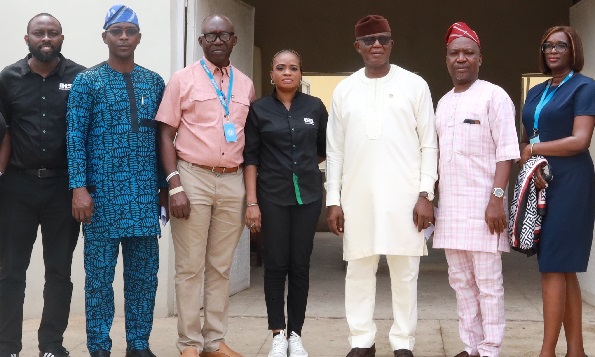News
Smile Emphasizes Value, Anytime Use in Revamped Data Plans

Smile has announced some significant changes to its data plans as a measure to cushion the negative effect of the COVID-19 pandemic on its customers and the nation’s economy.

On offer, is a range of data plans with tenor that range from Daily, Weekly, Monthly and even yearly. The Daily and weekly offers boast of varying validity periods of 1day, 2days and 7days. The price tag, in this category, ranges from N300 to N1,500 while the GB is between 1GB and 6GB.
For the monthly offer the validity period is 30 days can be used at anytime of the day and night. The prices range from N1,000 to N18,000 with data volumes and is between 1.5GB and 100GB.
The validity period for the BumpaValue plans offer three options of 60days, 90 days and 120 days with data volume of 50GB, 80GB and 100GB.
The crowning glory are the 1-year data plans with price range of N8,000, N16,000, N36,000, N70,000 and N120,000 and data volumes of 15GB, 35GB, 90GB, 200GB and 400GB.
Smile’s resolve to revamp its Data Plans, according to its Abdul Hafeez, Chief Marketing Officer, is to lessen the burden on families whose wards have been taking online classes at home and businesses whose workers have been working remotely by availing them the most competitive data offers in the market. “We are revamping all our data plans making them the BestValue, and usable anytime of the day” Hafeez surmised.
A cross section of customers on the Smile network has already commended the company for introducing more value, anytime use and greater affordability through the revamped data plans.
To Oluseyi Balogun, a Smile customer based in Anifowose Area of Ikeja, the revamped data plans will help cushion the biting effect of the inclement economic times. He gave kudos to Smile for always looking out for the best interest of its customers.
Ngozi Madukor, an undergraduate in one of the Higher Institutions in Lagos opined that the revamped data plans is pocket friendly and exactly what is needed by the teeming Nigerian youths whose disposable income is daily being depleted by contending needs.
Hafeez, while noting that the range of the revamped data plans on offer are unsurpassed in the value, further explained that the revamped data plans are very robust, wide ranging and versatile.
Each of the offerings is tailor-made for both the individual and corporate users. He urged forward-looking customers and prospects alike to embrace any of their preferred offerings and savour the benefits inherent in any of the revamped data plans.
Market watchers are unanimous in their view that Smile is continuously innovating to beat existing market benchmark all in a bid to provide products that will serve their customer’s best interest in the present turbulent market landscape. They urged the company to continue to innovate so as to always meet the demands of their customers and consumers.
News
SERAP Files Lawsuit Against NBC Over Ban on Eedris Abdulkareem’s Protest Song Tell Your Papa

Socio-Economic Rights and Accountability Project (SERAP) has filed a lawsuit against the National Broadcasting Commission (NBC) over its ban on Eedris Abdulkareem’s song Tell Your Papa, which allegedly criticizes President Bola Tinubu’s economic policies.

The NBC prohibited the song from being aired on radio and television, citing its “objectionable nature” and violation of “public decency standards.” SERAP, however, argues that the ban is arbitrary, illegal, and unconstitutional.
In the suit numbered FHC/L/CS/797/2025 filed at the Federal High Court in Lagos, SERAP is seeking an order to nullify the ban, describing it as inconsistent with the rights to freedom of expression, access to information, and media freedom. The group is also requesting a perpetual injunction to prevent NBC or any other authority from barring the song from being aired on broadcast platforms across Nigeria.
According to SERAP, the NBC’s April 9 directive to all broadcast stations banning the song is unlawful and incompatible with constitutional and international human rights standards. The organization states that censorship under the guise of “protecting public decency” cannot justify suppressing dissent or political commentary.
SERAP emphasizes that freedom of expression includes not only agreeable ideas but also those that challenge, shock, or disturb. It argues the ban has a chilling effect on artistic freedom and public discourse, noting that the NBC has not demonstrated any specific harm that the song might cause to legitimate state interests.
The group also challenges Section 3.1.8 of the Nigeria Broadcasting Code, describing it as overbroad and excessively intrusive. It argues that vague standards like “objectionable content” and “public decency” should not serve as pretexts for suppressing music critical of government policies.
Filed on behalf of SERAP by lawyers Kolawole Oluwadare, Oluwakemi Agunbiade, and Valentina Adegoke, the suit insists that all individuals have the right to freedom of expression and artistic creativity. The ban, they argue, fails to meet legal standards of necessity and proportionality.
Art, SERAP notes, plays a vital role in democratic societies by fostering dialogue, counter-narratives, and reflection on societal issues. Suppressing such expression stifles debate and undermines democracy.
The organization maintains that NBC’s action violates Section 39 of the 1999 Constitution, Article 9 of the African Charter on Human and Peoples’ Rights, and Article 19 of the International Covenant on Civil and Political Rights (ICCPR), to which Nigeria is a signatory.
Article 19 of the ICCPR protects the right to freedom of expression, including the freedom to seek, receive, and impart information and ideas in any form, including art. SERAP warns that unjustified censorship not only harms artists but also weakens public engagement, artistic livelihoods, and democratic culture.
News
Airtel Smartcash Set to Power Stress-Free Easter with Seamless Cashflow

As Nigerians prepare to celebrate Easter with loved ones across the country, leading mobile money operator Smartcash Payment Service Bank (PSB) has announced an easier system by which customers may upgrade their wallets from Tier 1 to Tier 3 for a smooth, cashless, and stress-free holiday experience.

Offering improved security, access, and reliability, the Smartcash app now enables instant verification with customers’ NIN or BVN, secure facial recognition with a selfie, and simplified address confirmation.
Upgrading from Tier 1 wallet provides higher transaction limits and access to more features and benefits as well as security.
According to the Chief Executive Officer of Smartcash PSB, Tunde Kuponiyi, Smartcash is concerned with ensuring a stress-free experience for customers.
“As the Easter season approaches, we recognize the financial pressure and logistical challenges that often come with holiday spending and mobility. That’s why we’re committed to ensuring that our users can carry out essential transactions from bank transfers to merchant payments quickly, safely, and conveniently.
“Our goal is to eliminate the stress of cash handling, long queues, and bank branch visits, so that Nigerians can truly focus on the spirit of the season connection, community, and celebration,” he said.
Smartcash PSB is providing a reliable, cashless alternative that meets the financial needs of users wherever they are. Whether it’s sending money to loved ones, paying at local markets and stores, or topping up airtime and data, Smartcash users can look forward to uninterrupted and efficient services throughout the holiday season.
Airtel Smartcash PSB, which launched as part of Airtel’s commitment to deepen financial inclusion, has rapidly expanded its network of agents and digital wallet users, bridging access between underserved communities and the financial system.
With services available through mobile phones and human agents across Nigeria, Smartcash offers a simple and accessible entry point into the digital economy particularly for small-scale traders, artisans, rural dwellers, and other players in the informal sector.
News
OOUTH Commends IHS Nigeria, UNICEF for Life-Saving Oxygen Plant Donation

IHS Nigeria, part of the IHS Holding Limited (NYSE: IHS) (“IHS Towers”) group, one of the largest independent owners, operators, and developers of shared communications infrastructure in the world by tower count, recently visited the Olabisi Onabanjo University Teaching Hospital (OOUTH), Sagamu, to evaluate the operational status and impact of the oxygen plant donated by IHS Nigeria in collaboration with United Nations Children’s Fund (UNICEF) and the Canadian Government in 2023 as part of a collaborative health infrastructure intervention initiative.

The oxygen plant which was donated as part of IHS Nigeria’s commitment to improving Nigeria’s healthcare system through sustainable, impactful initiatives is designed to serve not only the teaching hospital, but also other health facilities in the region.
The oxygen plant is equipped with 50 units of 6-cubic-meter cylinders and 150 units of 3 cubic meter cylinders that currently supplies critical departments across the teaching hospital including Anesthesia, the ICU, Pediatrics, Accident and Emergency, Labour, and Surgery departments. The hospital management acknowledged the difference the plant has made in ensuring prompt availability of oxygen even for patients who are unable to pay and in improving the medical outcomes for many patients who need oxygen as part of their management.
Accompanying the team on the visit was the Honorable Commissioner for Environment in Ogun State, Ola Oresanya, who was invited to witness the outcome of the partnership and its alignment with the state’s public health and environmental objectives.
He lauded the initiative for its timeliness and noted that the impact of the donation could not be easily quantified in terms of its relevance to healthcare delivery and its sustainable energy and environmental management which supports the state government’s vision for a healthier and more resilient Ogun State.
Titilope Oguntuga, Director, Sustainability, IHS Nigeria, commented “As a responsible organization, we find ways to impact communities in the markets we serve. In demonstrating our commitment, we also ensure that our investments are running smoothly, which is why we visited OOUTH. This is the first institution we donated an oxygen plant to and is also the first we are visiting to assess its impact and operational status.
“We are humbled by the acknowledgment and testimonies from the OOUTH management. This increases our resolve to continue to create meaningful and sustainable impact through infrastructure that saves lives and strengthens communities.”
Celine Lafoucriere, Chief of Field Office, UNICEF, commented “We cannot overemphasise the power of partnerships in achieving health equity. This is what building resilience in health systems entails: combining expertise, funding, and a shared goal.”
Dr. Oluseun Adeko, Chairman, Medical Advisory Committee (representing the Chief Medical Director of OOUTH), commented “This oxygen plant has not only enhanced our ability to manage emergencies and respiratory cases, but it has also saved lives beyond our hospital, as it serves as a source of oxygen for other hospitals. We deeply appreciate IHS Nigeria and UNICEF for their foresight and generosity.”

 Telecom3 days ago
Telecom3 days agoSalesforce Revolutionizes Business Intelligence with AI-Powered Tableau Next

 Broadcasting3 days ago
Broadcasting3 days agoMultiChoice Brings Easter Home with Dedicated Pop-Up Channel

 News3 days ago
News3 days agoAirtel Smartcash Set to Power Stress-Free Easter with Seamless Cashflow

 E-Business3 days ago
E-Business3 days agoDG NITDA Tasks Africa to Lead the AI Revolution Through Strategic Leadership, Inclusive Innovation

 E-Business3 days ago
E-Business3 days agoGoogle Blocks 5.1Bn Harmful Ads in 2024, Suspends 39m Accounts

 E-Financial3 days ago
E-Financial3 days agoHow CBEX Operators ‘Enticed’ Victims –SEC

 Telecom21 hours ago
Telecom21 hours agoMTN Nigeria Takes Broadband Services to the Next Level with FibreX Launch

 Broadcasting3 days ago
Broadcasting3 days agoEedris Abdulkareem Teases New Protest Anthem following NBC Ban


















